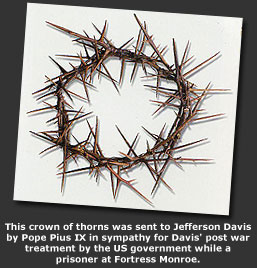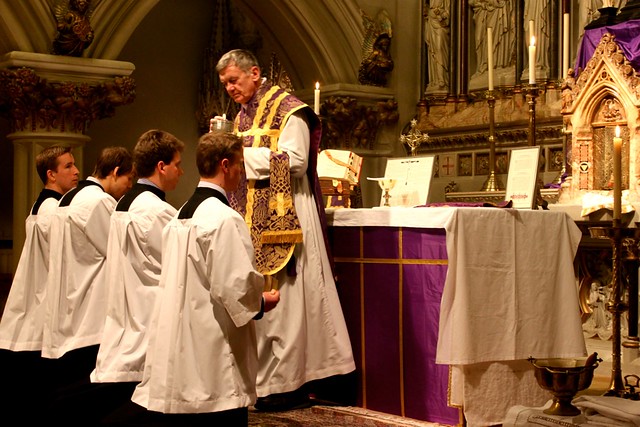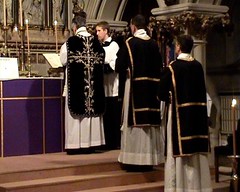 When there is a problem in the Church I always blame the Arians, I think they were at the root of of the sixteenth century schism, other people might well blame others; lizards or Masons, for my part I blame those Arians.
When there is a problem in the Church I always blame the Arians, I think they were at the root of of the sixteenth century schism, other people might well blame others; lizards or Masons, for my part I blame those Arians.
Maybe they are not formal Arians but there is always a tendency to strip Christ of some of his divinity, to make him a little less than God, to further empty him of his divinity, to take away from his dignity, to wash our hands of him.
It is man's nature to destroy God, that is what is is played out in Holy Week. It is as if we cannot bear to have him live amongst us. It is our fallen nature, we prefer darkness to light, being lost to being found, perdition to salvation. God for His part shows himself willing to put himself into our hands and endure the dreadful consequences.
Orthodox Catholicism is essentially about a correct Trinitarian belief. I have a suspicion that deep down the real problem with the Synod is one of the Divinity of Our Lord Jesus Christ, and His place within the Church, and how seriously we take him.
If Jesus is not truly God then he's guarantees about being with his Church until the end of time need not be taken too seriously. The idea of the Church being the very Body of Christ raised to life by the Father by being imbued with the Spirit gives way to a body that in some way adheres to him. Similarly if he is not 'God amongst us' then the power of the Holy Spirit has not been poured out on those who receive the sacraments, we are un-graced, and only have ourselves to rely on. Pelagianism is the next step on from Arianism.
Arianism was not just an academic heresy, in fact it was much more a pastoral one. Arians tend to see what is there and what is human rather than what is divine and can be accomplished by grace.
I have never found it in his writings but I remember told Athanasius said, 'You can tell an Arian by the way he treats the poor'. If we looking for signs of this heresy we should look for its simple 'cash value', how it causes us to treat the poor. The last great Arian Crisis, the Reformation, resulted very quickly in Germany, in the war against the peasants and in this country the poor being whipped from parish to parish.
Orthodoxy speaks of intimacy, Arianism of distance and the first to be distanced are always 'the little ones', on the poor, the unborn, the poor at the bottom of society, on children and those dependant on stable homes and marriages.
The effect on the liturgy of Arianism is that it makes the presence of Christ more distant. Abbot Paul Delatte in his commentary on the Rule of St Benedict says that the saint introduced the Gloria Patri in order to stop his monks praying with Arians. Today words tend to be ignored, so actions often tend to speak louder, there is a liturgical style that seems to indicate that the Mass far from being the Saving Sacrifice is merely a community gathering or a praise service and the Eucharist itself though not quite ordinary bread is far from the body, blood, soul and divinity of Our Lord Jesus Christ. Some might indeed argue that the stripping of the liturgy of many of its physical actions tends to Arianism.
In marriage itself the sacramental action of the Church creates the marriage, orthodox Christianity has the expectation that God en-graces the couple to be faithful and fruitful in grace, an Arian tendency would see little difference in sacramental act and non-sacramental co-habitation, that although God might indeed bless the marriage, he is not incarnate within it, he might be a benign watcher but he is not incarnate with in it.
I have never found it in his writings but I remember told Athanasius said, 'You can tell an Arian by the way he treats the poor'. If we looking for signs of this heresy we should look for its simple 'cash value', how it causes us to treat the poor. The last great Arian Crisis, the Reformation, resulted very quickly in Germany, in the war against the peasants and in this country the poor being whipped from parish to parish.
Orthodoxy speaks of intimacy, Arianism of distance and the first to be distanced are always 'the little ones', on the poor, the unborn, the poor at the bottom of society, on children and those dependant on stable homes and marriages.
The effect on the liturgy of Arianism is that it makes the presence of Christ more distant. Abbot Paul Delatte in his commentary on the Rule of St Benedict says that the saint introduced the Gloria Patri in order to stop his monks praying with Arians. Today words tend to be ignored, so actions often tend to speak louder, there is a liturgical style that seems to indicate that the Mass far from being the Saving Sacrifice is merely a community gathering or a praise service and the Eucharist itself though not quite ordinary bread is far from the body, blood, soul and divinity of Our Lord Jesus Christ. Some might indeed argue that the stripping of the liturgy of many of its physical actions tends to Arianism.
In marriage itself the sacramental action of the Church creates the marriage, orthodox Christianity has the expectation that God en-graces the couple to be faithful and fruitful in grace, an Arian tendency would see little difference in sacramental act and non-sacramental co-habitation, that although God might indeed bless the marriage, he is not incarnate within it, he might be a benign watcher but he is not incarnate with in it.





















